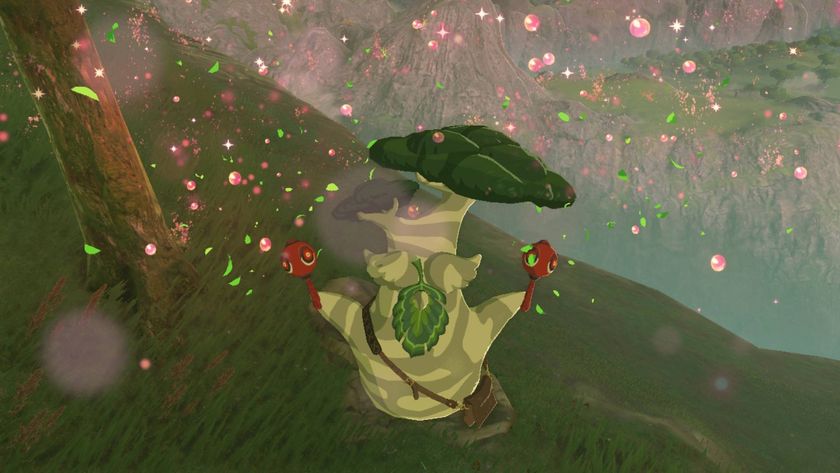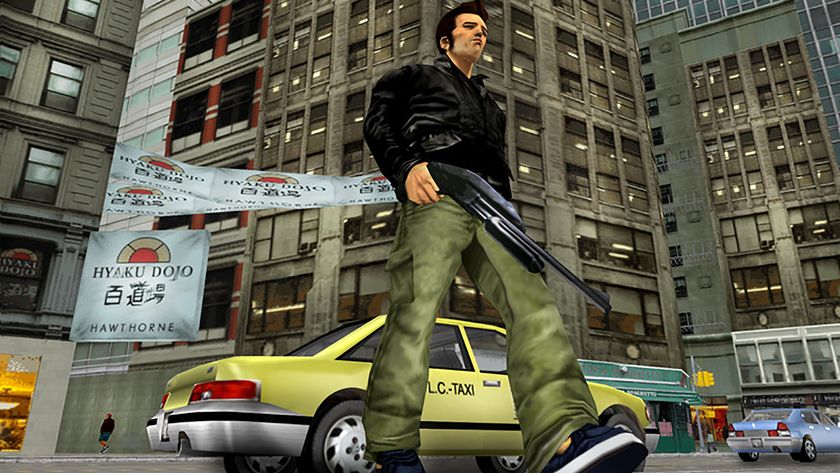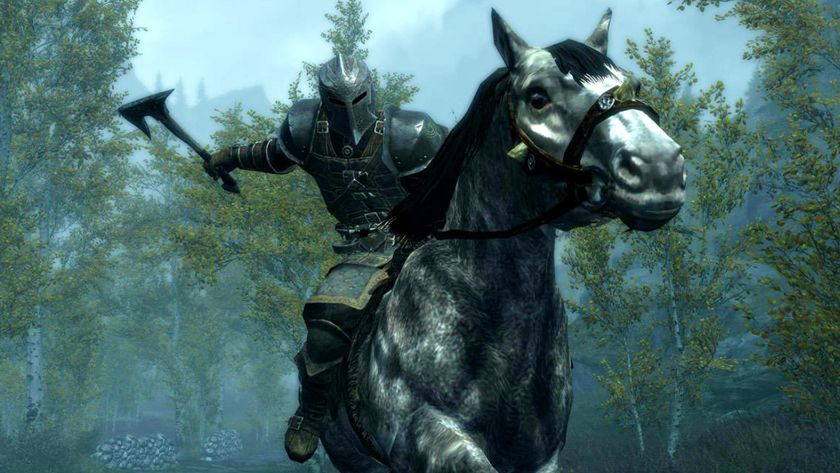Why do gamers hate Activision?
INTERVIEW: Activision Community Manager, Dan Amrich helps us trace back the rage

Who says a Week of Hate has to be all hurt and no healing? Activision is a company people love to hate, but let’s take a break from dogpiling on the monolithic publisher for its past misdeeds. We thought it’d be more interesting if we could get to the bottom of all the abject ire and the hardcore schadenfreude, to get to the bottom of gamer’s beef with the company. To help us in our quest, Acitivsion’s own community manager, Dan Amrich is going to help us trace back the origins of the anger, where hopefully we can see of how the publisher of Pitfall has managed to cast one of the most negative shadows in the medium. And maybe, just maybe, we can curtail a smidgen of the overwhelming, disproportionate amount of hate.
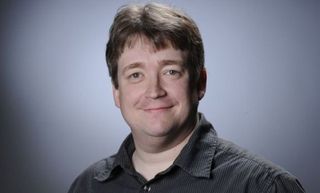
Above: The Mouth of Sauron!
[Full Disclosure: Dan used to work hereand is a very dear friend. What follows is more of a friendly conversation regarding semi-serious subject matter. If you’re looking for a scathing expose on Activision, you might want to look elsewhere. Better yet, go ask Dan yourself at his One of Swords blog or Twitter. Odds are he’ll get back to you.]
GameRadar: When exactly did Activision become the “evil empire?” As a post-Atari console gamer, they weren't even on my radar until the first Tony Hawk game.
Dan Amrich: I put it at December 2, 2007. That's when it was announced that Activision and Vivendi would merge. Vivendi owned Blizzard and Sierra at the time, so the resulting baby, in the summer of 2008, was Activision Blizzard. I think the moment Activision became the largest third-party game software publisher, the crosshairs moved from EA to Activision.

Above: KNEEL!
Suddenly people who had never really thought about who was at the company, what it really did, or anything other than "Yeah, I liked Pitfall when I was a kid and I like Tony Hawk games now," took a closer look and wanted to know more about who this major player was.
Sign up to the 12DOVE Newsletter
Weekly digests, tales from the communities you love, and more
GR: That's what I was guessing. But the hatred seems to be fueled by more than just surpassing EA, perhaps something about beloved PC dynasties falling under the Activision umbrella?
DA: Which dynasties? I know I go back but to me Activision PC dynasties are games like MechWarrior 2 and, during the 90s when they had a distribution deal with id, Quake II and Doom 3. You mean the Blizzard stuff?
GR: Well, we're trying to trace back the ire. Yet in spite of their association with older PC stuff, they've tampered very little with those franchises.
DA: I think Activision is smarter than people give it credit for sometimes. If something works, you let it keep working. Blizzard knows what it’s doing - their track record of quality and innovation speaks for itself. If you own Blizzard - and many people have, there were like four other companies that acquired Blizzard before Activision was involved - well, you let Blizzard be Blizzard. You give them what they need to do what they do. Anybody with a brain would do exactly what Activision does now - support without meddling.
GR: So you don't think the Blizzard merger is where the internet’s anger comes from primarily?
DA: I think people hate Activision for a combination of things. One, they are top dog - I call it the Yankees syndrome. The Yankees win, and the Yankees are a well-funded team, so people like to hate them. But the Yankees also have a lot of passionate fans that support the team because they like what the team does and what it is. But when you have that many World Series rings, you have that many sluggers in your bullpen... you are the natural target for all the other teams. That's totally understandable.
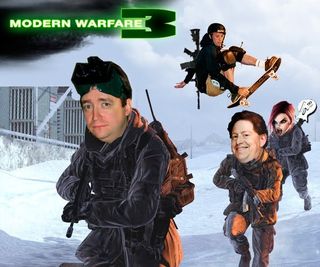
Above: Art by graboids
GR: That's sort of what I was getting at. I think the misconstrued hate is, to some degree, a byproduct of being incredibly successful. Yet there's a disproportionate amount of people out there who seem to delight in anything bad that befalls Activision. Seemingly desperate for them to fall or fail… how happen?!
DA: It comes with the territory. And in gaming, we are all trained from birth to root for the underdog. Duke Nukem - he's one man with a lot of guns and even more one-liners. He is going to save the universe through gunfire and dirty jokes. We root for him because the odds are so incredibly against him. We love that fantasy. Every RPG - the Kid from the tiny villiage/island/planet/whatever, is going to go on a Great Adventure and make a Big Difference. We root for him because he is insignificant, because there is no way he will succeed unless we believe he will succeed. He's the underdog. Activision is a multi-billion dollar corporation with a string of hit franchises, global success, and market leadership. That does not sound anything like an underdog to me.
GR: Would you say that part of the anger comes from a perception of Activision's success being "bought, not earned?"
DA: Activision has really earned its success. There's nothing to buy, you know? They make games that sell. They tell people about those games when they come out; they get as much attention as possible for those games so a lot of people will want to find out more and hopefully buy them. That does not make them unique compared to any other publisher out there, honestly. Every company wants the most success they can get, whether you're offering games or cars or you're a mom-and-pop restaurant down the block.
GR: But I still don't understand what drives a lot of the hate. People don't engage in the same kind of behavior in regards to successful companies like Nintendo, Rockstar or Valve. What makes Activision different?
DA: People are eager to see a company like Activision fail, and I think that's part of it. It's fun to rebel against authority... even if the authority is perceived. I mean, Activision makes games; you either like them or you don't. You buy them or you don't. The authority is the person opening with their wallet. So Activision is successful because a lot of people - even some of the most vocal critics - enjoy playing the games it makes. And that doesn't mean they do not have a legitimate criticism, but it does mean that they enjoy having it both ways.

Above: Activision's Singularity was a critical darling, but didn't make a huge impact at retail
Well, number two on the thing that causes the hate: I think Bobby Kotick has said a lot of things that people didn't like when they heard them. They didn't always hear them correctly - some were misquoted, some were accurately quoted but not in the full context, some were just jokes that bombed and got taken at face value - but they reacted to what they heard and made up their mind from there.

Above: The Mouth of Sauron!
[Full Disclosure: Dan used to work hereand is a very dear friend. What follows is more of a friendly conversation regarding semi-serious subject matter. If you’re looking for a scathing expose on Activision, you might want to look elsewhere. Better yet, go ask Dan yourself at his One of Swords blog or Twitter. Odds are he’ll get back to you.]
GameRadar: When exactly did Activision become the “evil empire?” As a post-Atari console gamer, they weren't even on my radar until the first Tony Hawk game.
Dan Amrich: I put it at December 2, 2007. That's when it was announced that Activision and Vivendi would merge. Vivendi owned Blizzard and Sierra at the time, so the resulting baby, in the summer of 2008, was Activision Blizzard. I think the moment Activision became the largest third-party game software publisher, the crosshairs moved from EA to Activision.

Above: KNEEL!
Suddenly people who had never really thought about who was at the company, what it really did, or anything other than "Yeah, I liked Pitfall when I was a kid and I like Tony Hawk games now," took a closer look and wanted to know more about who this major player was.
GR: That's what I was guessing. But the hatred seems to be fueled by more than just surpassing EA, perhaps something about beloved PC dynasties falling under the Activision umbrella?
DA: Which dynasties? I know I go back but to me Activision PC dynasties are games like MechWarrior 2 and, during the 90s when they had a distribution deal with id, Quake II and Doom 3. You mean the Blizzard stuff?
GR: Well, we're trying to trace back the ire. Yet in spite of their association with older PC stuff, they've tampered very little with those franchises.
DA: I think Activision is smarter than people give it credit for sometimes. If something works, you let it keep working. Blizzard knows what it’s doing - their track record of quality and innovation speaks for itself. If you own Blizzard - and many people have, there were like four other companies that acquired Blizzard before Activision was involved - well, you let Blizzard be Blizzard. You give them what they need to do what they do. Anybody with a brain would do exactly what Activision does now - support without meddling.
GR: So you don't think the Blizzard merger is where the internet’s anger comes from primarily?
DA: I think people hate Activision for a combination of things. One, they are top dog - I call it the Yankees syndrome. The Yankees win, and the Yankees are a well-funded team, so people like to hate them. But the Yankees also have a lot of passionate fans that support the team because they like what the team does and what it is. But when you have that many World Series rings, you have that many sluggers in your bullpen... you are the natural target for all the other teams. That's totally understandable.

Above: Art by graboids
GR: That's sort of what I was getting at. I think the misconstrued hate is, to some degree, a byproduct of being incredibly successful. Yet there's a disproportionate amount of people out there who seem to delight in anything bad that befalls Activision. Seemingly desperate for them to fall or fail… how happen?!
DA: It comes with the territory. And in gaming, we are all trained from birth to root for the underdog. Duke Nukem - he's one man with a lot of guns and even more one-liners. He is going to save the universe through gunfire and dirty jokes. We root for him because the odds are so incredibly against him. We love that fantasy. Every RPG - the Kid from the tiny villiage/island/planet/whatever, is going to go on a Great Adventure and make a Big Difference. We root for him because he is insignificant, because there is no way he will succeed unless we believe he will succeed. He's the underdog. Activision is a multi-billion dollar corporation with a string of hit franchises, global success, and market leadership. That does not sound anything like an underdog to me.
GR: Would you say that part of the anger comes from a perception of Activision's success being "bought, not earned?"
DA: Activision has really earned its success. There's nothing to buy, you know? They make games that sell. They tell people about those games when they come out; they get as much attention as possible for those games so a lot of people will want to find out more and hopefully buy them. That does not make them unique compared to any other publisher out there, honestly. Every company wants the most success they can get, whether you're offering games or cars or you're a mom-and-pop restaurant down the block.
GR: But I still don't understand what drives a lot of the hate. People don't engage in the same kind of behavior in regards to successful companies like Nintendo, Rockstar or Valve. What makes Activision different?
DA: People are eager to see a company like Activision fail, and I think that's part of it. It's fun to rebel against authority... even if the authority is perceived. I mean, Activision makes games; you either like them or you don't. You buy them or you don't. The authority is the person opening with their wallet. So Activision is successful because a lot of people - even some of the most vocal critics - enjoy playing the games it makes. And that doesn't mean they do not have a legitimate criticism, but it does mean that they enjoy having it both ways.

Above: Activision's Singularity was a critical darling, but didn't make a huge impact at retail
Well, number two on the thing that causes the hate: I think Bobby Kotick has said a lot of things that people didn't like when they heard them. They didn't always hear them correctly - some were misquoted, some were accurately quoted but not in the full context, some were just jokes that bombed and got taken at face value - but they reacted to what they heard and made up their mind from there.

